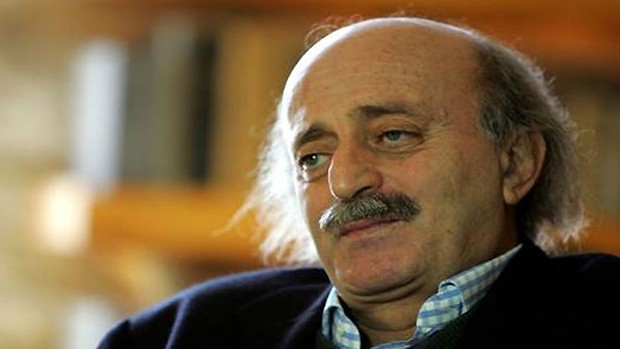Beirut, Asharq Al-Awsat—In the midst of the Lebanese parliament’s struggle to select a successor to President Michel Suleiman, Druze leader Walid Jumblatt said that he did not expect a new president to be chosen anytime soon.
In an interview with Asharq Al-Awsat, Progressive Socialist Party leader Walid Jumblatt discussed the protracted process to elect Lebanon’s next president, dismissing fears of a “presidential vacuum.”
Jumblatt, who has often served as kingmaker in Lebanese politics, is backing party member Henri Helou for president, with both the March 8 and March 14 Alliance calling on him to abandon his centrist position and pick a side.
Jumblatt is known for vacillating between the two main political blocs in Lebanese politics, but appears to be committed to charting a middle course as the May 25 deadline to choose Suleiman’s successor approaches. The next parliamentary session to choose a presidential candidate is scheduled for May 22.
Asharq Al-Awsat: What do you expect in the next round of voting on a new president?
Walid Jumblatt: Nothing. I do not expect anything, only a new round of voting and a lack of quorum based on the lack of any sign of reconciliation or new alliances. However, there is no vacuum only a presidential vacancy, particularly as there is a government which can assume presidential powers.
Q: Is there serious discussions among Lebanese leaders regarding choosing a new president? As we move closer and closer to the end of Michel Suleiman’s term, who are the main players who could succeed him?
So far, we are expecting the position to be vacant, unless something unexpected happens. There is the Free Patriotic Movement, and I do not believe that Michel Aoun will give up his aspirations for the presidency, even though he has not officially nominated himself. Despite this, Aoun is known to be a candidate.
Second, there is Lebanese Forces leader Samir Geagea.
Personally, I prefer a president who possesses qualities of moderation and will be a president of dialogue, not a president who is affiliated to one party or another. This is Progressive Socialist Party candidate Henri Helou, and I continue to support him on principle. His nomination is an indication that we are all partners in the battle, but each at a different level, and I do not place myself and Nabih Berri, for example, on the same level. I am responsible for some tragedies during the [civil] war and I admit to writing some of its darker pages; however, others talk as if they are angels. Henri Helou is one of the good guys, like Selim Hoss, and we must remind the Lebanese public that these people must be given an opportunity in the future.
Q: What about those who say that Helou’s nomination is tactical, in order to avoid choosing between the March 14 Alliance that is backing Geagea and the March 8 Alliance that is backing Aoun?
I am not trying to avoid anything. Michel Aoun’s and Samir Geagea’s plans are to stand [for the presidency], and that is their legitimate right, but Henri Helou is also a Christian [and thus has the right to stand]. I do not use avoidance but act according to my convictions, which I started to apply after the 2008 conflict in Lebanon, seeking to achieve a centrist position. I look at where I was before this conflict, and where I am now, and thank God that I have achieved some success in this regard.
Q: As leader of a major parliamentary bloc, you could throw your support behind one of the two main factions to guarantee that presidential candidate a majority. Will you serve as a kingmaker to secure one party a majority for a candidate?
It is not simply a majority [is required to select a president], a quorum of two-thirds must be secured before the vote can even take place. I support Speaker Nabih Berri despite all the interpretations that are being put forward regarding this “quorum.” Second, and as I said before, I will continue to support Henri Helou, according to my centrist principles.
Q: Where will your decision leave Lebanon, which is suffering an ongoing power vacuum?
There is no vacuum, but a vacancy for the post of president until an agreement can be reached. We are hoping for a president that will start where president Suleiman left off, namely with the Baabda declaration, which is a vital and essential agreement.
Q: So we are not going to see anything dramatic in the near future?
I do not feel any embarrassment [about this situation]; my conscience is clear as I turn the page on my political career, particularly as this may be the last presidential vote in which I cast my ballot.
Q: Does this mean you don’t intend to run in the next parliamentary elections?
I am seriously considering it.
Q: And if you do run?
Everything will be announced at a suitable time.
Q: What about your son, Taymor, who now holds a senior position within the Progressive Socialist Party?
He is preparing himself for the elections. As for him taking over the party, that’s a different issue, as there are two years left in my leadership term.
Q: If you do decide not to run for parliament again, would that be a retirement from politics?
There is no retirement, but after 37 years—from 1977 until today—my life is rich with experience, despite the presence of some dark episodes, but I will let history write my story. I will not personally write my biography—let others write it. I will not run in the parliamentary elections, but will carry on in politics as an observer.
This is an abridged version of an interview originally conducted in Arabic.

